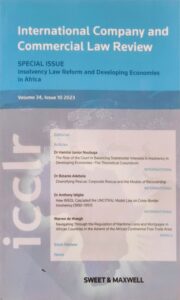Preparing for the boom in maritime trade following AfCFTA
 The paper argues that it is crucial to assess, at this point in time, whether the maritime law frameworks of different African countries are prepared to accommodate and facilitate expected growth in maritime trade. It considers this period critical because the African continent is standing on the brink of a new era with the imminent full launch of the African Continental Free Trade Area (‘AfCFTA’), which promises to boost trade in African countries by removing different tariffs and other trade barriers in intra-African trade. As a result, maritime trade and ship owning in African countries is also expected to increase substantially. It is also important because more African countries are domesticating or considering the domestication of the Model Law on Cross Border Insolvency (MLCBI) which holds consequences for their maritime law frameworks.
The paper argues that it is crucial to assess, at this point in time, whether the maritime law frameworks of different African countries are prepared to accommodate and facilitate expected growth in maritime trade. It considers this period critical because the African continent is standing on the brink of a new era with the imminent full launch of the African Continental Free Trade Area (‘AfCFTA’), which promises to boost trade in African countries by removing different tariffs and other trade barriers in intra-African trade. As a result, maritime trade and ship owning in African countries is also expected to increase substantially. It is also important because more African countries are domesticating or considering the domestication of the Model Law on Cross Border Insolvency (MLCBI) which holds consequences for their maritime law frameworks.
Accordingly, the paper examines the regulation of maritime liens and mortgages which are particularly relevant in this respect. Both categories of legal instruments secure claims against shipowners with a preferred right on the ship to which the claim relates: Maritime liens are granted by operation of law to certain categories of claims which are considered crucial for the operation of the ship (e.g. seafarers wages, salvage claims, and port-related duties), while ship mortgages are a conventional financial security instrument typically used to secure loans to the shipowner. Correspondingly, in different ways, both categories perform a crucial function to the facilitation of maritime trade.
Maritime liens and mortgages
The paper examines the framework of maritime liens and mortgages, which it notes can differ considerably depending on the applicable law from which they originate. Among African countries, differences also exist between national frameworks, particularly with respect to the categories of claims to which the law accords maritime lien status. However, these differences often still seem to be a remnant of the framework of the respective colonising countries, rather than truly reflecting differences in national socio-economic priorities.
Hence, to accommodate the increase in maritime trade, the paper recommends that African countries reassess their domestic socio-economic priorities in this field and, if necessary, adapt their maritime liens and mortgages framework correspondingly. Although these socio-economic priorities can differ depending on the relevant country, African countries would generally benefit from a framework in which maritime lien protection is granted extensively to different categories of creditors crucial to maritime trade. By protecting these creditors, better-developed services to the ship can be safeguarded, as necessary for the expected increase in maritime trade.
The paper argues further that initiatives to unify this field of law on a regional level should be encouraged. Previous initiatives have indicated that, national differences are too substantial at this point in time to achieve truly uniform law on a global level. However, the uniform Maritime Code of the Communauté Economique et Monétaire des Etats de l’Afrique Centrale (‘CEMAC’) illustrates that regional harmonisation efforts on this matter can be successful given the socio-economic similarities of neighbouring countries. Overall, such regional harmonisation efforts could create more legal certainty for all actors involved in maritime trade, hence also facilitating the expected growth in maritime trade in African countries. Moreover, these regional harmonisation efforts can act as a stepping stone towards future international uniformization.
Maritime liens and mortgages and the UNCITRAL Model Law
Finally, given their nature as security for claims, the robustness of maritime liens and mortgages is only truly tested in case of insolvency of the shipowner: the paper argues that their preferred right should allow lienholders and mortgagees to be compensated with priority over competing creditors. However, under the globally most acclaimed cross-border insolvency instrument, the UNCITRAL Model Law on Cross-Border Insolvency, (MLCBI) maritime liens and mortgages risk losing this protection. By virtue of the concept of modified universalism underlying the MLCBI, the entire international insolvency must in principle be administered in a single jurisdiction. By contrast, maritime liens and mortgages typically take effect by their direct enforcement on the ship, hence on a territorial basis.
Various African countries have also enacted this Model Law. Hence, in these countries as well, this instrument could affect the crucial role maritime liens and mortgages play for the facilitation of maritime trade. While advocating for the renunciation of the Model Law would be irresponsible, considering the proven value of this instrument to administer international insolvencies, African countries should be alert to the freedoms afforded under the MLCBI. Most pertinent in this regard is the feature that permits domestic lawmakers to adjust its provisions to fit within their domestic context. Accordingly, enacting countries, including African countries, ought to include a limited exception to the modified universalism of the MLCBI in favour of a territorial administration of maritime liens and mortgages.
For the full paper: W. De Waegh, ‘Navigating Through the Regulation of Maritime Liens and Mortgages in African Countries in the Advent of the African Continental Free Trade Area’ [2023] 34 ICCLR 620.
Warren de Waegh is a PhD Researcher at the Erasmus School of Law. He is available at: dewaegh@law.eur.nl.
